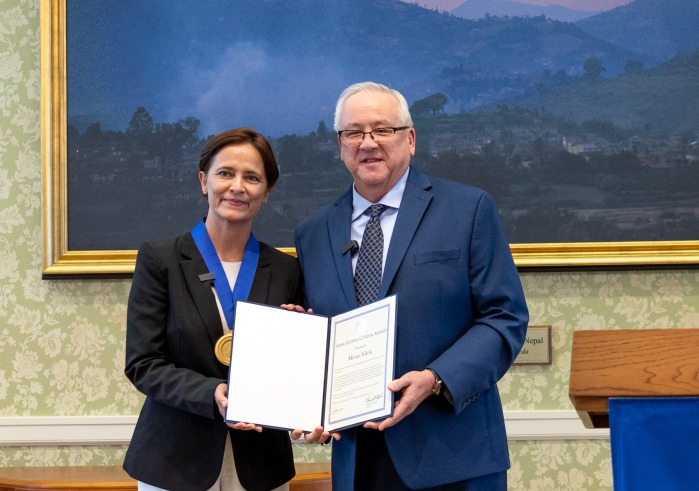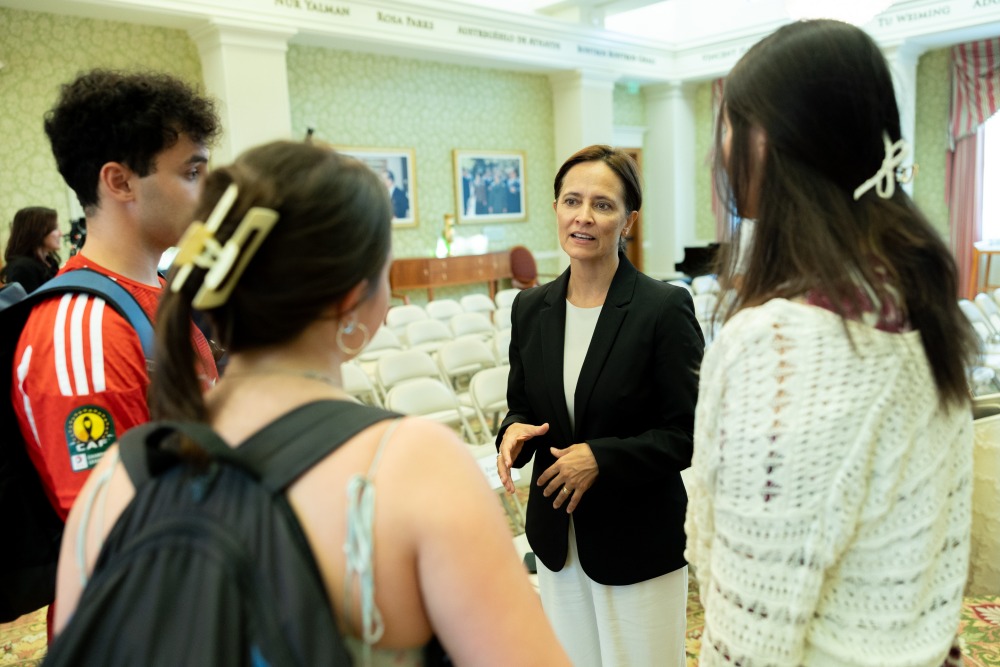Empowering Future Eco-Leaders: SUA Honors Dr. Mirian Vilela, Announces Partnership with Earth Charter International

“What if we change the narrative of collapse into one of possibilities and hope?” asked Dr. Mirian Vilela during her remarks upon accepting the 2024 Soka Global Citizen Award. “What if we are the generation that will be known for having made social injustices become history and sparking the beginning of a new civilization, one that is ecologically conscious?”
These farsighted questions have defined Vilela’s career as the executive director of the Earth Charter International Secretariat and the Center for Education for Sustainable Development at the U.N.-mandated University for Peace in Costa Rica, where she has worked to educate and empower environmental leaders from around the world.
On September 5, SUA President Edward Feasel presented Vilela with the Soka Global Citizen Award at a ceremony in Founders Hall attended by students, faculty, and staff. Vilela was selected for this year’s award, said President Feasel, “for her decades of championing sustainable development and education for global citizenship, for her compassionate leadership…and for her fearless commitment to peace and protecting our planet.”
During the ceremony, Vilela and President Feasel signed a memorandum of understanding, officially starting a new partnership between SUA and Earth Charter International. This collaboration between institutions will enable a group of SUA students to visit the Earth Charter Education Center in San José, Costa Rica, as part of a Learning Cluster course this January. Earth Charter International will also provide online courses in sustainability for select SUA students, faculty, staff, and alumni.
“We are very happy to begin a new collaboration between Soka University of America and Earth Charter International,” Vilela said in an interview prior to the award ceremony. “We have so many commonalities in the way we see the world and our philosophy of life.”
Throughout Vilela’s two-day visit to SUA, she and Michael Bracken, chair of the Earth Charter International Board, met with various SUA community members to discuss sustainability and the exciting partnership between their respective institutions. At a lunch with student sustainability educators and the Soka Student Union Executive Council, Vilela and Bracken shared guidance in response to student questions on how to encourage their peers to adopt more eco-friendly habits. They also exchanged ideas on how to combat the powerlessness that many people feel in the face of the climate crisis.
“In moments of despair, having a historical perspective may help,” Vilela said. “Historically, we have seen significant changes in society based on individual initiatives. Why were they possible? Studying how those significant changes occurred and how environmental initiatives were successful would empower us.”
Vilela and Bracken also met with graduate students, faculty, and members of the university administration. Reflecting on her interactions with everyone she met on campus, Vilela expressed admiration for how deeply the SUA community is dedicated to the university’s mission.
“We can certainly see a coherence in the mission, the values that are at the foundation of this institution, and the way in which people are in their mindsets and how they see education,” she said. “It’s very inspiring.”
“A Touch of Magical Realism”: Vilela’s Advice for Future Environmental Leaders
In her speech following the award conferment, Vilela shared three main points of advice for those looking to become leaders in sustainability. The first: We cannot accomplish anything alone. She highlighted the importance of seeking collaboration and support, of bringing people together across cultures, organizations, and areas of expertise. Her second recommendation was to continuously strengthen one’s resilience and ability to adapt in the face of unexpected challenges.
“I often envision myself as a bamboo,” she said. “The bamboo is flexible. It’s strong. It can take a lot of strong wind. Because of its interconnected roots and its flexibility, the bamboo doesn’t break.”
Her final point of advice for emerging leaders in sustainability was to cultivate a view of the world that balances realism with “a good portion of magical realism.” She explained that, rather than being an escape from reality, seeing the world through such a lens is crucial to understanding reality and visualizing a more just and sustainable world.
“Infusing a touch of magical realism in our everyday lives helps us see beyond the confines of the possible and embrace the wonder hidden in the routine,” Vilela explained. “It fuels our creativity and opens our minds to the potential of change, helping us believe that a different world is possible.”
To illustrate her point, she gave historical examples of monumental changes in history, such as the abolition of slavery in Brazil and the fall of the Berlin Wall. She argued that these changes required individuals to engage in magical realist thinking to imagine a world without the oppressive systems that seemed all-powerful at the time.
Following her talk, Vilela engaged in a Q&A session with attendees. In response to a question from an undergraduate student about fostering interconnectedness in the sustainability movement, she underscored the need to stop thinking about sustainability in a compartmentalized way.
“A key competence or skill in sustainability involves the capacity to see the connections between things and the interconnectedness of life,” she said. “But it’s very hard for most people, because they say, ‘No, let’s take care of human needs, in addressing poverty. And afterwards, we’ll address issues of sustainability.’ This is a problem with our sight, with our capacity to see the connections.”
The event closed with an uplifting call to action from Vilela, who asked the audience to reframe the concept of an ecological footprint in order to envision more positive ways to contribute to sustainability.
“I invite you to think about a regenerative footprint,” she said. “It’s not just looking at, ‘What’s my environmental impact? How can I shrink my environmental footprint?’ But rather to think, ‘How can I increase my regenerative footprint, my positive impact on my path here?’”

